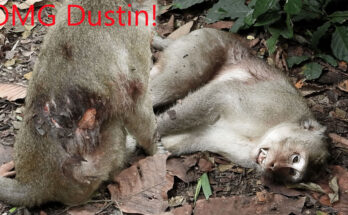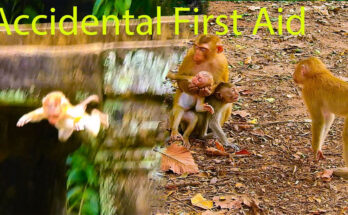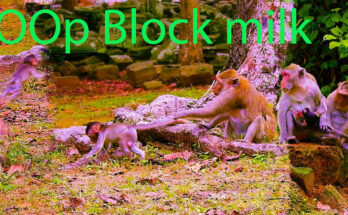What Is Happening with the Baby Monkey?
In the heart of the dense jungle, where towering trees stretched toward the sky and vines twisted like serpents, a tiny baby monkey clung to a fragile branch. Its small fingers trembled as it gripped tightly, eyes wide with confusion and fear. Just hours ago, it had been nestled safely against its mother’s warm chest, feeling the steady rhythm of her heartbeat. But now, it was alone.
The mother monkey had been weak for days, her body struggling to keep up with the demands of caring for her newborn. Food had been scarce, and exhaustion had taken its toll. As the troop moved quickly through the jungle, she had faltered, unable to keep pace. In her desperate attempt to stay with the group, she had dropped her baby. The newborn had tumbled down through the branches, landing in a thick patch of leaves.
At first, the baby monkey lay still, too shocked to move. It let out a tiny cry, a desperate call for its mother, but no one answered. The jungle was vast, and the echoes of its call faded into the distance. The baby shivered, not just from the cool air but from the terrifying realization that it was alone.
For a newborn monkey, separation from its mother meant danger. Without her warmth and nourishment, survival was uncertain. Every movement in the undergrowth, every shadow that flickered in the dim light, could be a predator lurking nearby. Snakes, eagles, and even leopards roamed this part of the jungle, always on the lookout for easy prey.
Minutes passed like hours as the baby whimpered, clinging to a low branch. Then, the sound of rustling leaves made it freeze. Something was approaching. Was it its mother? Hope flickered in the baby’s eyes, but the movement came from the wrong direction.
A pair of glowing eyes peered through the foliage—a civet, a small but deadly jungle predator. It sniffed the air, drawn by the scent of the vulnerable infant. The baby let out another cry, this one filled with panic. The civet crept closer, its sleek body moving with practiced silence.
Just as it seemed the baby’s fate was sealed, a sudden flurry of movement disturbed the jungle. A young female monkey from the troop leaped onto a nearby branch, her sharp eyes scanning the ground. She had heard the baby’s cries and returned to investigate. Seeing the civet, she let out a sharp warning call.
The civet hesitated. Though small, the monkey was fast and agile. If she called the rest of the troop, the predator would be outnumbered. With a low growl, it slinked back into the shadows, vanishing as quickly as it had appeared.
The young female monkey climbed down, reaching for the trembling infant. She carefully scooped it up, pressing it against her chest. The baby clung to her fur, instinctively seeking comfort and warmth. She nuzzled it, reassuring the tiny creature that it was no longer alone.
With the baby safely in her arms, she began the climb back to the troop. She moved swiftly, her strong limbs carrying them upward through the branches. The baby’s cries softened, replaced by the gentle breathing of a newborn finding comfort again.
When she reached the others, the troop greeted her with curiosity. Some sniffed the baby, others chattered softly. But the mother was not there. She had been too weak to return, and now, the baby belonged to the troop. The young female who had rescued it would likely care for it as her own.
The baby monkey’s fate had taken an unexpected turn. Though it had lost its mother, it had found a new protector. In the unpredictable world of the jungle, survival depended on resilience, luck, and the kindness of those willing to step in.
As the troop continued their journey, the baby clung tightly to its new guardian, its future uncertain but no longer hopeless.


